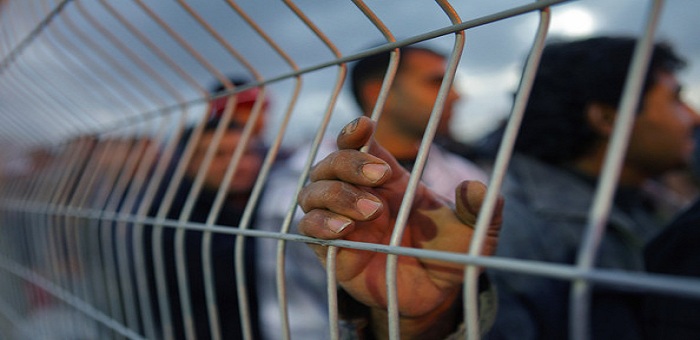Rights of Palestinian Workers Deceased in Israel Buried along with their Bodies
According to the latest statistics, 100 thousand Palestinian workers were forced to join the Israeli labor market, due to the lack of job opportunities and low wages in the Palestinian territories, and work in very severe conditions that led during the past five years to the death of 184 workers amid Israeli disregard of their lives and poor Palestinian efforts to protect their rights.

Hasnaa Al Rantisy – Palestine Economy Portal
Translated by Tamara Barakat
A report issued by the Knesset Research and Information Center on the death of workers in construction-related accidents indicates that “in the past five years, the number of construction workers who died due to falling – 184 – greatly exceeds the number of Israeli civilians killed in attacks and wars.”
The editorial team of Haaretz Newspaper criticized in its article the Israeli Government’s disregard for the lives of Arab and foreigner workers. When it comes to inspection, there are solely 17 inspectors - who receive low pay – and 5 cars designated for the inspection of 12 thousand construction sites.
Safety measures are completely nonexistent in the construction sites of these huge buildings that bring great amounts of profits for their owners. The employers do not provide the appropriate helmets or safety measures for the workers, and rather provide them with dilapidated tower cranes.
Deceased Workers: an Estimate Number
Nasser Qatami, the Deputy at the Ministry of Labor, said that 2015 witnessed 18 deaths among construction workers.
Mustafa Hanani, from the Occupational Health and Safety Department in the Palestinian General Federation of Trade Unions (PGFTU), indicated that according to the PGFTU, 14 deaths among workers in Israel were recorded. He explains, “We are unable to reach the workers from distant governorates, especially those who smuggle into Israel, and who form 20-30% of workers subject to construction-related accidents.”
Hanini also said that number of deaths and accidents that take place in the West Bank is higher. This year, 22 Palestinian workers died during the performance of their job in various governorates, the majority of which work in the construction sector. One worker died in a carpentry and another in a food factory.
Role of the Ministry of Labor
Questioning the follow up on the rights of the deceased workers can be seen as a luxury when one perceives the negligence represented in the inability to round up the number of these workers.
Qatami justifies this, saying, “We do not have any accurate statistics because not all deaths are recorded at the Ministry. We have the official information for the workers who hold legal permits, but we do not follow up or have any connection with those who smuggle into Israel to work.”
The father of Hamada Salim Salameh, one of the late construction workers from Qabalan near Nablus, complained about the fact that no one from the government, unions, or even the media got in touch with him. He said that his son died while working on a crane tower in Israel six months ago, and none of whom he worked for asked about his rights. He added that he appointed a lawyer in order to demand his son’s rights; however, this was a personal initiative without any guidance or support from any relevant party.
Permit Distribution Facility
Moreover, Qatami admits the Ministry of Labor functions only as a “permit distribution facility.” Not only that, but the Ministry does not even control the issuance of the permits. Therefore, these permits are the only channel of contact between the Ministry and the workers. Whoever obtains a permit can demand some of their rights, but “there are always Israeli obstacles, procrastination, and lack of cooperation in fulfilling the workers’ rights.”
The Ministry claims that it plays a role in demanding the workers’ rights, but Israeli sources reveal that only 11 indictments were filed regarding the 184 deaths of workers in Israel. All of them were closed with court deals involving a penalty of few thousand shekels and some months of community service.
Qatami affirms this, saying that since 1970, a great number of workers did not receive their rights, unless they went to court and individually filed a lawsuit.
Importance of Permits
Furthermore, Qatami explains that according the cases that the Ministry reviewed, the Israeli employer transfers the injured Palestinian workers after giving them first aid to hospitals in the West Bank.
In order to receive their rights, Hanani says that the workers must provide official proof of work obtained either from the hospital, the employer, or through a police report.
Hanani also explains that the Israeli employers throw injured Palestinian works at checkpoints for the Palestinian Authority to receive them, which makes it difficult to prove that they died while performing their job. And here lies the importance of the permit since it reveals who the employer of the worker is and all the other necessary details.
He adds, “We have lawyers at the Union, and we can help whoever seeks our help. However, the workers are unaware about who to go to for help and what to do, and might easily give up their rights due to Israeli obstacles. And we were able to help some of the workers gain their compensation through Israeli insurance companies.”
A Partial Agreement
Qatami criticized the efforts of the PGFTU since it does not provide any services up to the level of the deductions that it takes from the workers. He affirmed that the Ministry of Labor is reviewing the agreement made between the Palestinian Trade Union and the Histadrut. He says, “This was a partial agreement that led to conceding a part of the workers’ rights to the Histadrut, despite the fact that it does not provide them with anything.”
He also said that there is an intention to form a national committee to administer the money of workers and determine how it is to be used in order to benefit them in gaining their rights.





